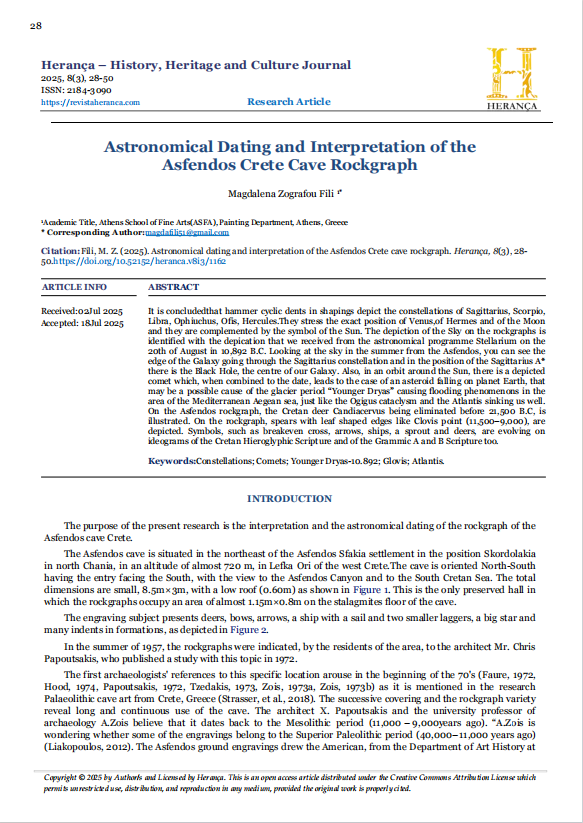Astronomical Dating and Interpretation of the Asfendos Crete Cave Rockgraph
Palavras-chave:
Constelações, Cometas, Younger DryasResumo
Datação astronômica e interpretação dos grafismos rupestres da caverna de Asfendos, Creta
Downloads
Referências
Anderson, D. G., Goodyear, A. C., Kennett, J., & West, A. (2011). Multiple lines of evidence for possible human population decline/settlement reorganization during the early Younger Dryas.Quaternary International, 242(2), 570–583.
Beattie, J., & Kriel, N. (2019). “Is The Starry Night Turbulent?” – Cornell Univercity.DOI:10.48550/arXiv.1902.03381.
Bradley, B., & Stanford, D. (2004). The North Atlantic ice-edge corridor: a possible Palaeolithic route to the New World.World Archaeology,36(4), 459-478. doi:10.1080/0043824042000303656
Brauer, A., Endres, C., Günter, C., Litt, T., Stebich, M., & Negendank, J. F. (1999). High resolution sediment and vegetation responses to Younger Dryas climate change in varved lake sediments from Meerfelder Maar, Germany.Quaternary Science Reviews,18(3), 321-329.
Firestone, R. B., West, A., Kennett, J. P., Becker, L., Bunch, T. E., Revay, Z. S., ... & Wolbach, W. S. (2007). Evidence for an extraterrestrial impact 12,900 years ago that contributed to the megafaunal extinctions and the Younger Dryas cooling.Proceedings of the National Academy of Sciences,104(41), 16016-16021.https://doi.org/10.1073/pnas.0706977104
Giriraj, K., & Krishna, R. (2014).Manual of Cupule Replication Technology.Rock Art Reseach, 4(3), 101-120. DOI:10.3390/arts4030101
Liakopoulos, I. (2012). Archaeologist, Asfentos Cave - Ministry of Civilization and Athletics. Retrieved from http://odysseus.culture.gr/h/2/gh251.jsp?obj_id=9929
Liritzis, I. (2010). “Strofilas (Andros, Greece): new evidence on the Cycladic Neolithic period through innovative methods of dating with the use of obsidian luminescence and hydration”.Journal of Archaeological Science,37(6), 1367-1377. https://doi.org/10.1016/j.jas.2009.12.041
Napier, W. M. (2010).Palaeolithic extinctions and the Taurid Complex. Monthly Notices of the Royal Astronomical Society, 405(3), 1901-1906. Doi:10.1111/j.1365-2966.2010.16579.x
Ocobock, C., & Lacy, S. A. (2024). The theory that men evolved to hunt and women evolved to gather is wrong. InGender in Cross-Cultural Perspective(pp. 5-12). Routledge.
Pino, M., Abarzúa, A. M., Astorga, G., Martel-Cea, A., Cossio-Montecinos, N., Navarro, R. X., ... & Kennett, J. P. (2019). Sedimentary record from Patagonia, southern Chile supports cosmic-impact triggering of biomass burning, climate change, and megafaunal extinctions at 12.8 ka.Scientific reports,9(1), 4413.
Strasser, T. F., Murray, S. C., van der Geer, A., Kolb, C., & Ruprecht Jr, L. A. (2018). Palaeolithic cave art from Crete, Greece.Journal of Archaeological Science: Reports,18, 100-108.
Sweatman, B, M., & Tsikritsis, D. (2017). Decoding Göbekli Tepe with archaeoastronomy: What does the fox say?.Mediterranean Archaeology and Archaeometry (MAA), 17(1), 233-250.

Downloads
Publicado
Como Citar
Edição
Secção
Licença
Direitos de Autor (c) 2025 Herança - Revista de História, Património e Cultura

Este trabalho encontra-se publicado com a Licença Internacional Creative Commons Atribuição 4.0.






8.png)





